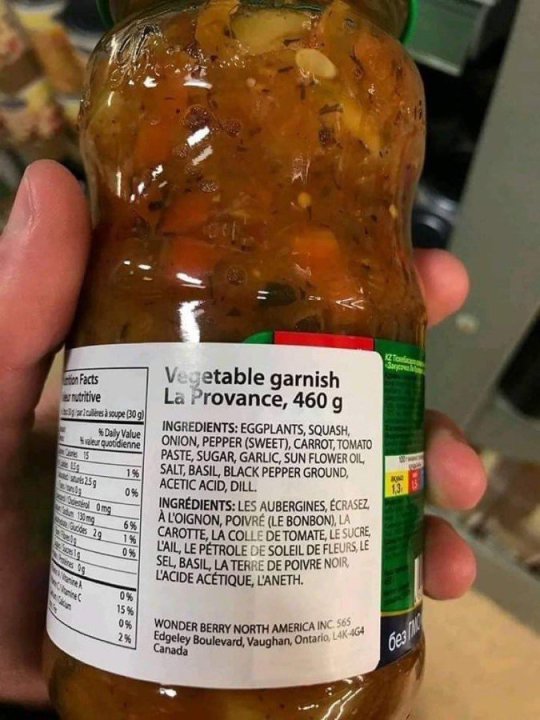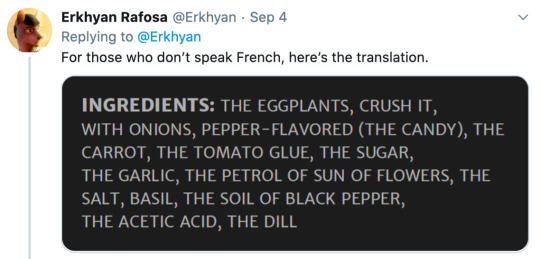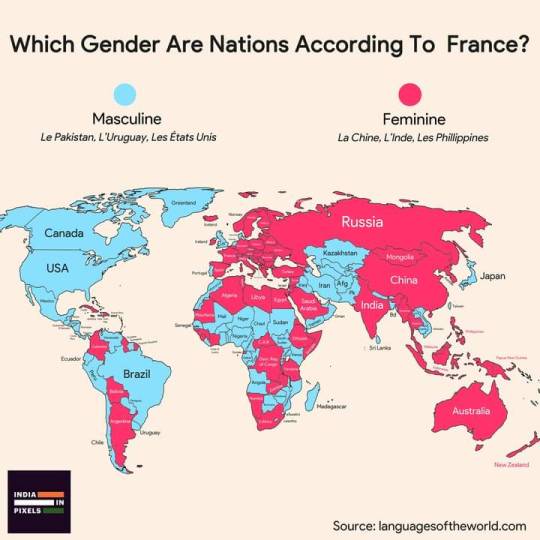Text
L’alphabet phonétique
Les voyelles
[a] open front unrounded vowel - cinéma (cinema, m); hat
[ɑ] open back unrounded vowel - château (castle, m); hot
[e] close-mid front unrounded vowel - clé (key, f); may
[ɛ] open-mid front unrounded vowel - père (father, m), chêne (oak, m); bed
[ə] mid central vowel/schwa - jeu (game, m); bird
[i] close front unrounded vowel - souris (mouse, f); free
[o] close-mid back rounded vowel - rose (rose, f); UK yawn
[ɔ] open-mid back rounded vowel - océan (ocean, m); thought
[ø] close-mid front rounded vowel - jeudi (thursday)
[œ] open-mid front rounded vowel - peur (fear, f)
[u] close back rounded vowel - chou (cabbage, m); boot
[y] close front rounded vowel - tu (you); UK few
This vowel diagram shows the inside of the throat from the left side (pronounce /i/ “eee” and /ɑ/ “aaa” to feel the difference). Antérieur: front, postérieur: back, aperture: opening of the lips.
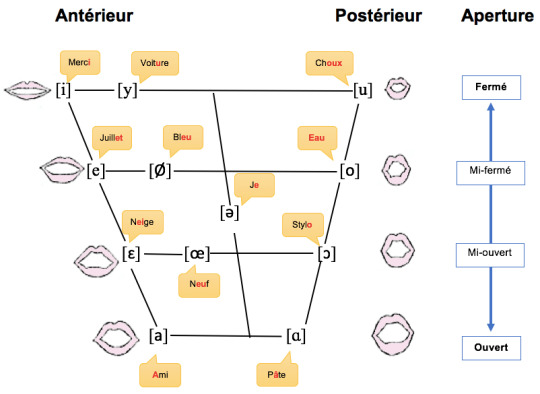
Les voyelles nasales (followed by a consonant except -h- or ending a word)
[ɑ̃] > am, an, (é)en, em, aon - temps (time, m)
[ɛ̃] > aim, ain, eim, ein, em, (i)en, im, in, um, un, ym, yn - pain (bread, m)
[ɔ̃] > om, on - ombre (shadow, f), bonjour (hello)
[œ̃] > um, un - humble, un (one, m); dying, turning into [ɛ̃]
N.B. When a nasal sound is produced, despite being made of two letters, they are to be pronounced as their own sound: in Bonjour, the /o/ and the /n/ shouldn’t be heard at all since they are followed by the consonant /j/, as opposed to the usual dragging of /o/ then /n/ like in Bonne journée.
Les semi-voyelles
[j] voiced palatal approximant - lieu (place, m); you
[ɥ] voiced labial–palatal approximant - huile (oil, f); wall
[w] voiced labial–velar approximant - oui (yes); witch
Les consonnes
[b] voiced bilabial plosive - bête (beast, f)
[d] voiced dental and alveolar plosive - déjeuner (lunch, m)
[f] voiceless labiodental fricative - faim (hunger, f)
[g] voiced velar plosive - gâteau (cake, m)
[ʒ] voiced postalveolar fricative - ange (angel, m); vision
[k] voiceless velar plosive - cadeau (gift, m)
[l] voiced apical alveolar approximant - lait (milk, m)
[p] voiceless bilabial plosive - pain (bread, m)
[ʁ] voiced uvular fricative - roi (king, m)
[s] voiceless alveolar fricative - sel (salt, m); nonsense
[t] voiceless denti-alveolar plosive - table (table, f)
[v] voiced labiodental fricative - violon (violin, m)
[z] voiced alveolar fricative - maison (house, f)
[ʃ] voiceless postalveolar fricative - chocolat (chocolate, m)
Les consonnes nasales
[m] voiced bilabial nasal - miel (honey, m)
[n] voiced denti-alveolar nasal - nez (nose, m)
[ɲ] voiced palatal nasal - montagne (mountain, f)
[ŋ] voiced velar nasal - connexion (connection, f); sing
Voiced sounds are those that make our vocal chords vibrate when they are produced; voiceless sounds are produced from air passing through the mouth at different points. Fricatives are consonants with the characteristic that when they are produced, air escaped through a small passage and make a hissing sound; plosives are a type of consonant produced by forming a complete obstruction to the flow air out of the mouth.
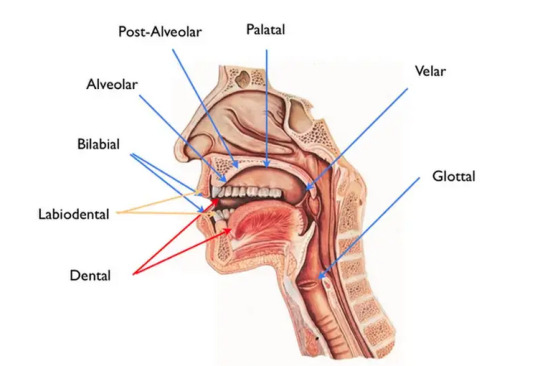

Movie: Le fabuleux destin d'Amélie Poulain - Jean-Pierre Jeunet, 2001
Fanmail - masterlist (2016-) - archives - hire me - reviews (2020-) - Drive
438 notes
·
View notes
Text
Word List: Amélie

Artichoke - a tall Mediterranean composite herb (Cynara scolymus) resembling a thistle with coarse pinnately incised leaves
Bijou - a small dainty usually ornamental piece of delicate workmanship; jewel
Billet-doux - a love letter
Chimera - an illusion or fabrication of the mind
Clandestine - marked by, held in, or conducted with secrecy; surreptitious
Cloudland - the realm of visionary speculation or poetic imagination
Emerald - brightly or richly green
Figment - something made up or contrived
Fluorescence - the emission of visible light by a gemstone when exposed to a light source whose light we normally cannot see
Furtive - done in a quiet and secretive way to avoid being noticed
Gemütlichkeit - cordiality, friendliness
Grail - the object of an extended or difficult quest
Meliorism - the belief that the world tends to improve and that humans can aid its betterment
Mirage - something that comes from or exists only in the mind and is not real
Moiety - half of something
Pipe dream - an illusory or fantastic plan, hope, or story
Quietude - a quiet state; repose
Rosiness - having qualities which inspire hope or optimism
Saffron - a moderate orange to orange yellow
Scintilla - spark, trace
Subterranean - existing in secret
Taciturnity - temperament marked by disinclination to talk
Terminus - a final goal; a finishing point
Timorous - of a timid disposition
Valediction - an act or utterance of farewell
More: Word Lists
125 notes
·
View notes
Text
Is this a regional thing? What region/s?
~
928 notes
·
View notes
Text
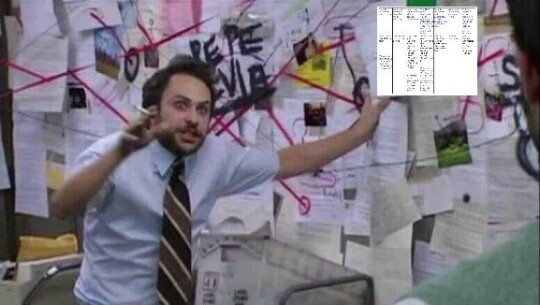
me when people ask me how to say "I don't care" in french
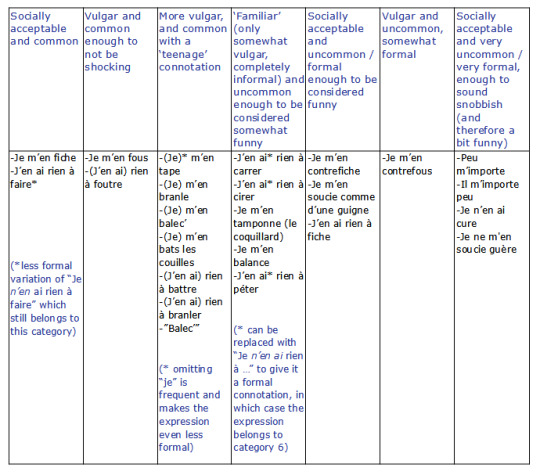
(description:)
The IASIP meme of Charlie Kenny gesturing wildly at a conspiracy board, with the second picture added to his papers - the second picture being a table with 7 columns classifying an exhaustive number of ways of saying "I don't care" in French, based on how common, vulgar and funny they each are.
Column 1: Socially acceptable and common: -Je m’en fiche -J’en ai rien à faire* (*less formal variation of “Je n’en ai rien à faire” which still belongs to this category)
Column 2: Vulgar and common enough to not be shocking: -Je m’en fous -(J’en ai) rien à foutre
Column 3: More vulgar, and common with a ‘teenage’ connotation: -(Je)* m’en tape -(Je) m’en branle -(Je) m’en balec’ -(Je) m’en bats les couilles -(J’en ai) rien à battre -(J’en ai) rien à branler -”Balec’” (* omitting “je” is frequent and makes the expression even less formal)
Column 4: ‘Familiar’ (only somewhat vulgar, completely informal) and uncommon enough to be considered somewhat funny: -J’en ai* rien à carrer -J’en ai* rien à cirer -Je m’en tamponne (le coquillard) -Je m’en balance -J’en ai* rien à péter (* can be replaced with “Je n’en ai rien à …” to give it a formal connotation, in which case the expression belongs to category 6)
Column 5: Socially acceptable and uncommon/formal enough to be considered funny: -Je m’en contrefiche -Je m’en soucie comme d’une guigne -J’en ai rien à fiche
Column 6: Vulgar and uncommon, somewhat formal: -Je m’en contrefous
Column 7: Socially acceptable and very uncommon / very formal, enough to sound snobbish (and therefore a bit funny): -Peu m’importe -Il m’importe peu -Je n’en ai cure -Je ne m'en soucie guère
2K notes
·
View notes
Photo

I just learned that the Russian word for “ladybug” translates to “God’s Little Cow”
178K notes
·
View notes
Text
news documentary channels in french on youtube
hi everyone! recently i've been listening to news documentaries for listening practice. the language is understandable and it exposes you to a bunch of different topics. i'll update the list as i find more!
arte: on the shorter side in comparison with the videos from the other channels, varied reporting on lots of different topics, but i'm especially a fan of the episodes about social media and the internet.
food story: exactly what it sounds like, documentaries about food, how it's made, restaurants, etc.
750g tv: this one is similar to food story, in case you want more varied options.
ailleurs - reportages voyages: travel and tourism, in a lot of their videos they go to french communities in other countries to see why they moved to that place, what they are doing in the local community, etc.
a decouvert: this channel is about finances and the economy, but for some reason i really like their videos on how supermarkets run.
reportages et investigations: this channel isn't as specialized as the others, but as a result has a large variety of topics to choose from.
if you know of any others, send them my way and i'll check them out and add them to the list!
341 notes
·
View notes
Photo
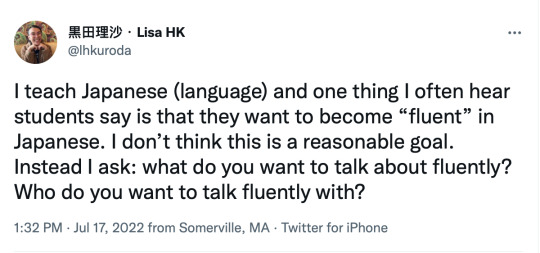
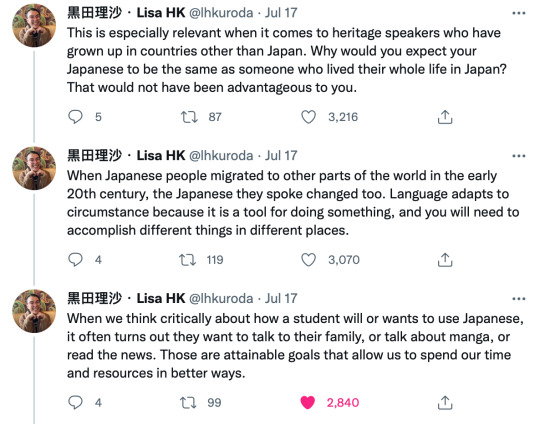

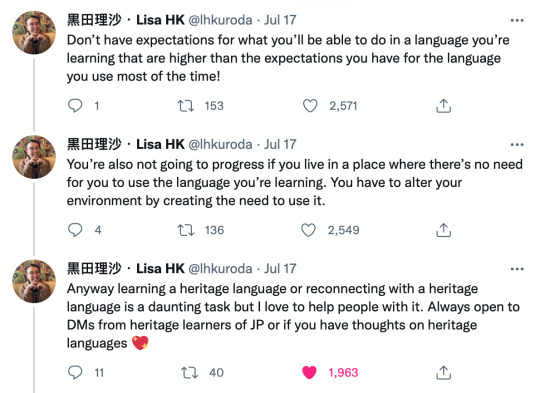
This Twitter thread really spoke to me. I wanted to share it with anyone who hasn’t seen it.
37K notes
·
View notes
Text
Duolingo Sucks, Now What?: A Guide
Now that the quality of Duolingo has fallen (even more) due to AI and people are more willing to make the jump here are just some alternative apps and what languages they have:
"I just want an identical experience to DL"
Busuu (Languages: Spanish, Japanese, French, English, German, Dutch, Italian, Portuguese, Chinese, Polish, Turkish, Russian, Arabic, Korean)
"I want a good audio-based app"
Language Transfer (Languages: French, Swahili, Italian, Greek, German, Turkish, Arabic, Spanish, English for Spanish Speakers)
"I want a good audio-based app and money's no object"
Pimsleur (Literally so many languages)
Glossika (Also a lot of languages, but minority languages are free)
*anecdote: I borrowed my brother's Japanese Pimsleur CD as a kid and I still remember how to say the weather is nice over a decade later. You can find the CDs at libraries and "other" places I'm sure.
"I have a pretty neat library card"
Mango (Languages: So many and the endangered/Indigenous courses are free even if you don't have a library that has a partnership with Mango)
"I want SRS flashcards and have an android"
AnkiDroid: (Theoretically all languages, pre-made decks can be found easily)
"I want SRS flashcards and I have an iphone"
AnkiApp: It's almost as good as AnkiDroid and free compared to the official Anki app for iphone
"I don't mind ads and just want to learn Korean"
lingory
"I want an app made for Mandarin that's BETTER than DL and has multiple languages to learn Mandarin in"
ChineseSkill (You can use their older version of the course for free)
"I don't like any of these apps you mentioned already, give me one more"
Bunpo: (Languages: Japanese, Spanish, French, German, Korean, and Mandarin)
76K notes
·
View notes
Text
134 notes
·
View notes
Text
Here is a (non-exhaustive) list of free resources for different sign languages:
American Sign Language (ASL)
Australian Sign Language (Auslan)
Australian Indigenous Sign Languages
Black American Sign Language (BASL)
Brazilian Sign Language (LSB)
British Sign Language (BSL)
Chinese Sign Language (CSL)
Emirati Sign Language (ESL)
French Sign Language (LSF)
Italian Sign Language (LIS)
Indian Sign Language (ISL)
International Sign Language (IS)
Irish Sign Language (ISL)
Japanese Sign Language (JSL)
New Zealand Sign Language (NZSL)
Mexican Sign Language (LSM)
Plains Indian Sign Language (PISL)
Polish Sign Language (PJM)
Ukrainian Sign Language (USL)
Yolŋu Sign Language (YSL)
Please feel free to add on if you know of others, be it more resource for one of the sign languages above, or resources for learning any of the other 300 plus sign languages.
Edit: I updated the ASL reference to Bill Vicars, but reminder that these are just things I found around, please find Deaf teachers wherever possible! And for ASL, lifeprint.com is another wonderful resource.
25K notes
·
View notes
Text
I love the term “loanwords” because it implies that you intend to give them back.
76K notes
·
View notes
Text
Grand + vowel
Grand (Big, tall, growing) is the masculine singular adjective related to Grandeur. When followed by a consonant, you don't pronounce it: Un gran(d) lit. But when followed by a vowel (or an -h, which is necessarily be followed by a vowel), instead of making a -d- liaison, you actually have to turn it into a T.
This phenomenon is called an articulatory relaxation (Un relâchement articulatoire) which is when a letter is naturally turned into another one easier to pronounce. Here we have an "amuïssement", the disappearance, muting of a sound, from a voiced (sonore) final consonant to an unvoiced (sourde) final consonant.
A few typical examples:
Le grand amour - True love
Un grand homme - A great man
Un grand artiste/auteur - A great artist/writer
Grand Hôtel
Grand-Est (train station)
The same process exists the other way around, which is why Neuf (Nine) can turn into Neuvième (Ninth) or any French determiner ending in a -s (Les, Trois) followed by a vowel triggers a -z- liaison: Des enfants > Dé-z-enfan.
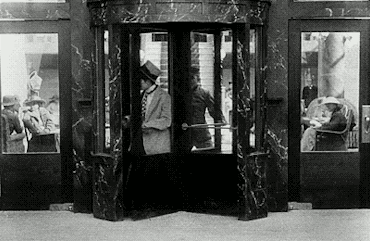
156 notes
·
View notes
Text
Le passé simple
The passé simple is a literary tense that is used to mark a brief action that occurs once. It’s equivalent in speaking is the passé composé. It is slowly falling out of use, especially the nous and vous conjugations, but it’s still important to learn because a lot of books use it.
Passé simple en a
This conjugation applies to the verbs from the first group (ending in -er) as well as aller
Je: -ai, aimai
Tu: -as, aimas
Il/elle: -a, aima
Nous: -âmes, aimâmes
Vous: -âtes, aimâtes
Ils/elles: -èrent, aimèrent
Passé simple en i
This conjugation applies to the verbs from the second group (ending in -ir) as well as some verbs from the third group (irregular verbs)
Je: -is, finis
Tu: -is, finis
Il/elle: -it, finit
Nous: -îmes, finîmes
Vous: -îtes, finîtes
Ils/elles: -irent, finirent
Passé simple en u
This applies to the remaining verbs from the third group (irregular verbs)
Je: -us, courus
Tu: -us, courus
Il/elle: -ut, courut
Nous: -ûmes, courûmes
Vous: -ûtes, courûtes
Ils/elles: -urent, coururent
Passé simple pour tenir/venir
This applies only to the verbs tenir and venir
Je: -ins, tins/vins
Tu: -ins, tins/vins
Il/elle: - int, tint/vint
Nous: -înmes, tînmes/vînmes
Vous: -întes, tîntes/vîntes
Ils/elles: -inrent, tinrent/vinrent
Unfortunately there is no simple rule allowing us to know when a verb in the third group uses the conjugation with i or with u. The verbs using the conjugation with u must be memorized. Here are some:
Courir
Vouloir
Connaître
Savoir
Pouvoir
Boire
Croire*
Croître*
Valoir
Vivre
Plaire
Taire
Résoudre
*In order to avoid mixing up croire and croître, croître keeps its accent circonflexe (^) at all times (croire only uses it for the nous and vous conjugations)
579 notes
·
View notes
Text
sich etwas hinter die Ohren schreiben
literally: to write oneself something behind one's ears
to remember something important very well
Our ancestors used to make their children witness important events and gave them a slap on the back of the ear so that they could remember the event better and pass the knowledge on to later generations.
30 notes
·
View notes
Text
A little German text style guide
Here are some rules about how to use quotation marks, dates, times, numbers, and addresses in German texts:
Quotation marks:
Quotation marks in German texts usually look like this:
„Hallo, ich heiße Espen.“
„Ich glaube nicht“, sagte er, „aber ich bin mir nicht sicher.“
Er sagte: „Ich habe einen Apfel gegessen.“
Date:
The date is written in the form day/month/year, usually like this:
am 3. August 2023 (read: "am dritten August 2023")
am 03.08.2023 (read: "am dritten August 2023")
Time:
The time is usually stated in a 24 hour format (otherwise you add 'in the morning' or 'in the evening' to clarify):
Es ist 18:40 Uhr. (read: "Es ist 18 Uhr 40")
Es ist 4 Uhr nachmittags.
Numbers:
The points and commas in numbers look like this:
eleven thousand = 11.000 (e.g. 11.000 Maschinen)
eleven point three = 11,3 (e.g. 11,3% Umsatz)
Address:
Addresses on letters are usually written like this:
Max Mustermann (first & last name)
Musterstraße 11 (street name & house number)
12345 Musterstadt (postcode & city)
Germany (country)
432 notes
·
View notes

